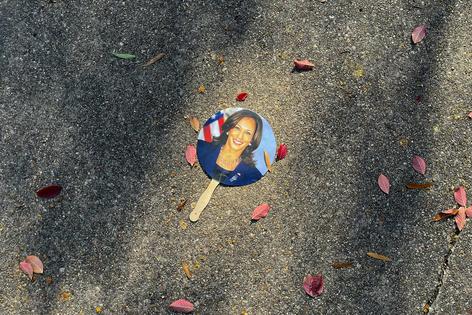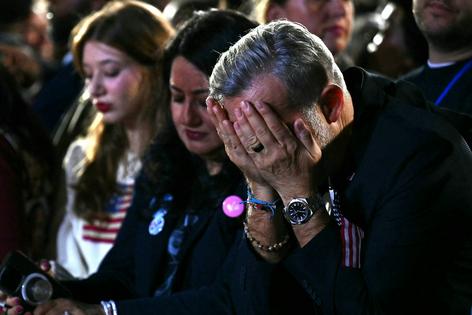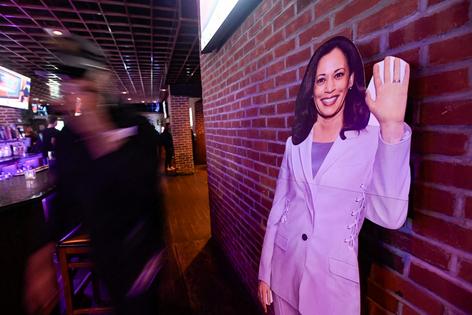America’s glass ceiling remains − here are some of the reasons why a woman may have once again lost the presidency
Published in Political News
Kamala Harris was a candidate of many firsts, including the first Black and South Asian woman to run for president as the Democratic nominee.
Her resounding, swift loss in the presidential race to Republican Donald Trump on Nov. 5, 2024, means many things to different people, including the fact that American voters are unable to break the glass ceiling and elect a woman as president.
Amy Lieberman, a politics and society editor at The Conversation U.S., spoke with Farida Jalalzai, a scholar of women political leaders and gender in politics, to better understand the significance of Harris’ defeat – and how the U.S. stands apart from other countries that have had female leaders.
How important was Kamala Harris’ gender in her loss?
I can’t say it was a main reason she lost. But what I can say is it was a factor that contributed to her lack of support, especially when you compare her performance with Joe Biden’s in the same places and with almost all of the same voting groups he won in 2020. Gender was part of the campaign landscape in many different ways this election. Trump and his supporters used insulting tropes about what a woman leader would look like on the world stage. He used a lot of misogynistic and racist appeals in his campaign and tried to mobilize voters in ways that aimed to reinforce patriarchy.
What does Harris’ loss say about where gender equality stands in the country?
I am not surprised that the glass ceiling for women in politics is still super durable in the U.S. This is an example of the country’s limits of making true progress on women’s empowerment and equality. Of course, the fact that Harris was a woman of color vying to be the first woman president of the U.S. is pertinent.
Trump asserted that the country needs a strong man to lead. He portrayed Harris as a liberal extremist and generally got the message through that a woman would not be up to the job of president.
When Geraldine Ferraro ran as the first female vice presidential candidate nominated by a major party in 1984, there were a lot of questions about whether she would be tough enough on the world stage. Now, there are still questions about whether a woman would be tough enough to lead.
How does this election compare with Hillary Clinton’s 2016 campaign against Trump?
In 2016, Hillary Clinton highlighted the historic nature of a woman running for president of the U.S. – and, of course, she received nearly 3 million votes more than he did, though she still lost the election. Harris was reluctant to mention the historic nature of her candidacy. She did not mention this when she gave her acceptance speech at the Democratic National Convention in August 2024. She recently explained this by saying, “Well, I’m clearly a woman. The point that most people really care about is can you do the job and do you have a plan to actually focus on them.”
Another important factor is Trump’s political trajectory. In 2016, Trump was still seen as an outlier and an extremist. Many political scientists – including myself – did not think he would receive the nomination, let alone win the general election that year. We see now that Trump is the new normal of the Republican Party. More moderate Republicans, such as Liz Cheney, are also not in power anymore. The party has become more extreme.
Is the country moving backward on gender equality, or is it stuck in neutral?
A few months ago, I would have said that the country is moving forward, but I feel like it’s moving backward now. That Trump’s sexist and racist messages resonated with a substantial number of people – or at least did not bother some enough – is a concern. Trump also said extreme things about women in 2016, including calling Hillary Clinton “a nasty woman.” This time around, these attacks seemed more normalized, saying that Harris was in a powerful political position only because she traded sexual favors, for example.
Women have led other countries. What makes the U.S. different?
The U.S. is a nuclear power and a major military and economic force. These realms are typically stereotyped by some as masculine. The president stands atop the U.S. political system and is directly elected. Women leaders often ascend through appointment as prime ministers in parliamentary systems. One of the vulnerabilities of prime ministers is that their terms in office are less secure. The traits deemed fitting for these roles – seeking compromise, for example – may prove less of a challenge to women than they would if they were seeking to be president of a powerful country like the U.S. on the world stage.
Only two women presidents in power in presidential systems were directly elected, and they are in Honduras and Mexico. The former is a former first lady, and the latter has strong ties to her predecessor. While women have been presidents of countries, several, such as the current presidents of Ethiopia, India and Greece, are essentially symbolic. Those positions are very different from the U.S. presidency, which has a more dominant role.
It is also pretty uncommon for a woman to be elected president in a presidential system without being a member of a powerful political family or without being supported by a male predecessor. When you look at Laura Chinchilla, the former president of Costa Rica, or former president of Brazil Dilma Rousseff, what connected a lot of these female politicians is that they were very much aided by male predecessors.
Cristina Elisabet Fernández de Kirchner, the former president of Argentina, had a wealth of political experience before she came to office in 2007, but she served immediately after her husband, Néstor Kirchner, was president.
There is a complexity to these cases, and a lot of these women brought in their own political credentials and experience. But there is still a tendency to have the additional demand that women in politics have these connections.
This article is republished from The Conversation, a nonprofit, independent news organization bringing you facts and trustworthy analysis to help you make sense of our complex world. It was written by: Farida Jalalzai, Virginia Tech
Read more:
Trump’s comeback victory, after reshaping his party and national politics, looks a lot like Andrew Jackson’s in 1828
Kamala Harris’ sudden political rise echoes that of another female politician, New Zealand’s Jacinda Ardern
US voters say they’re ready for a woman president − but sexist attitudes still go along with opposition to Harris
Farida Jalalzai does not work for, consult, own shares in or receive funding from any company or organization that would benefit from this article, and has disclosed no relevant affiliations beyond their academic appointment.


































































Comments